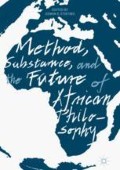Abstract
In this chapter we begin some empirical legwork into the question in respect of the sort of intellectual progress that has been made by African philosophers or African philosophy following the metaphilosophical debate in the decades past about its existence, nature, and substance. We consider this investigation to be important for African philosophy not just for stocktaking purposes or the least because of the rising unease, discussions, and protests around a lack of transformation in universities in Africa and the need to Africanize or decolonize the philosophy curriculum in universities in Africa. These are important considerations for embarking on a stocktaking exercise of African philosophy. However, in addition to these considerations, we think that a proper assessment will help invigorate African philosophy and direct African philosophers towards ways of plotting its trajectory for the future. From the data presented, we drew, amongst others, a couple of preliminary conclusions including that philosophy programs in many of the universities in sub-Saharan Africa are westernized, and that there are minimal courses offered in African philosophy in those universities.
Access this chapter
Tax calculation will be finalised at checkout
Purchases are for personal use only
Notes
- 1.
The data were gathered over a period of months preceding and shortly after the September 9–11, 2015 African Philosophy (African Philosophy: Past, Present and Future) Conference at the University of the Witwatersrand. This was only followed with some minor and loose confirmation during the review period of this essay in 2016 and 2017. Given this information, the reader therefore would want to bear in mind that there may have been some movement or shift in the data. For example, a few more universities may now be offering more or less courses in African philosophy (some that didn’t offer any course before now offering courses, and some that previously did offer courses not offering them any longer).
- 2.
William (1962).
- 3.
Momoh (2000: 2).
- 4.
Engels (1976: 65).
- 5.
Janz (n.d.: 4).
- 6.
Etieyibo (2014).
- 7.
Wintle (2013).
- 8.
Parkkinen (2015: 66).
- 9.
Kimmerle (n.d.).
- 10.
Hengelbrock (n.d.).
- 11.
Graness (1996: 199).
- 12.
Chimakonam 2015: 31).
References
Abraham, William. 1962. The Mind of Africa. London: Weidenfeld and Nicolson.
Chimakonam, O. Jonathan. 2015. Conversational Philosophy as a New School of Thought in African Philosophy: A Conversation with Bruce Janz on the Concept of “Philosophical Space”. Confluence: Journal of World Philosophies, 3: 9–40.
Engels, Fredrick. 1976. Ludwig Feuerbach and the End of Classical German Philosophy. Peking: Foreign Languages Press.
Etieyibo, Edwin. 2014. Post-modern Thinking and African Philosophy. Filosofia Theoretica: Journal of African Philosophy, Culture and Religions 3 (1): 67–82.
Graness, Anke. 1996. Interview with Professor Peter O. Bodunrin. Quest: An International African Journal of Philosophy 9/10 (1/2): 198–210.
Hengelbrock, Jurgen. n.d. You Cannot Free Yourself from Hegel: An Encounter with Heinz Kimmerle. In The Stranger Between Oppression and Superiority Close Encounter with Heinz Kimmerle, Intercultural Communication. www.galerie-inter.de/kimmerle. Retrieved March 2, 2016.
Janz, Bruce. n.d. African Philosophy. Available at http://pegasus.cc.ucf.edu/~janzb/papers/37AfPhil.pdf.
Kimmerle, Heinz. n.d. You Cannot Free Yourself from Hegel: A Response to Jurgen Hengelbrock by Heinz Kimmerle. In The Stranger Between Oppression and Superiority Close Encounter with Heinz Kimmerle, Intercultural Communication. www.galerie-inter.de/kimmerle. Retrieved March 2, 2016.
Momoh, Campbell S. 2000. In The Substance of African Philosophy, ed. Campbell S. Momoh, 2nd ed. Auchi: African Philosophy Project.
Parkkinen, Veli-Pekka. 2015. Interview with Sandra Mitchell and James Woodward. The Reasoner 9 (8): 65–68.
Wintle, Angela. 2013. A C Grayling on Growing Up, Discovering Philosophy and the Meaning of Life. The Daily Telegraph, March 15. Available at http://www.telegraph.co.uk/culture/culturenews/9933425/A-C-Grayling-on-growing-up-discovering-philosophy-and-the-meaning-of-life.html. Retrieved Saturday March 26, 2016.
Author information
Authors and Affiliations
Editor information
Editors and Affiliations
Rights and permissions
Copyright information
© 2018 The Author(s)
About this chapter
Cite this chapter
Etieyibo, E.E., Chimakonam, J.O. (2018). The State of African Philosophy in Africa. In: Etieyibo, E. (eds) Method, Substance, and the Future of African Philosophy. Palgrave Macmillan, Cham. https://doi.org/10.1007/978-3-319-70226-1_5
Download citation
DOI: https://doi.org/10.1007/978-3-319-70226-1_5
Published:
Publisher Name: Palgrave Macmillan, Cham
Print ISBN: 978-3-319-70225-4
Online ISBN: 978-3-319-70226-1
eBook Packages: Religion and PhilosophyPhilosophy and Religion (R0)

